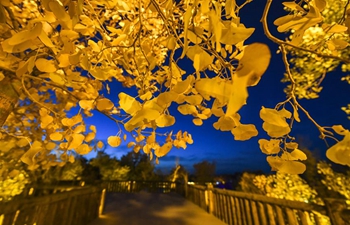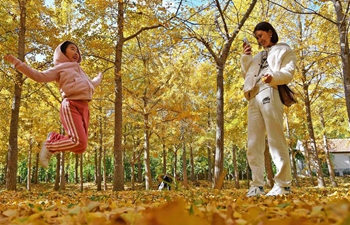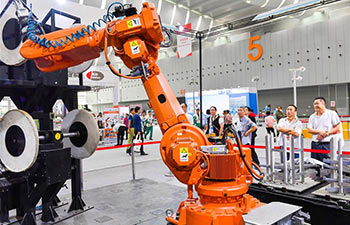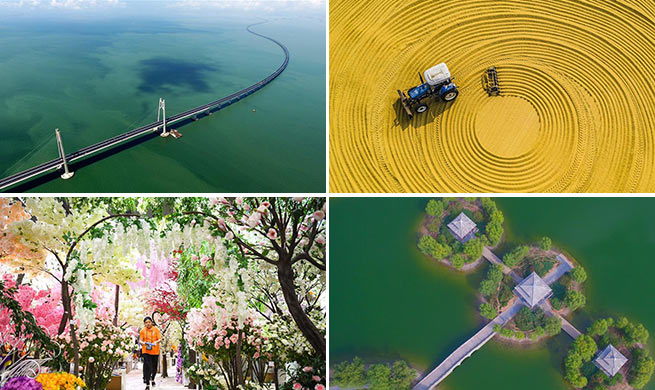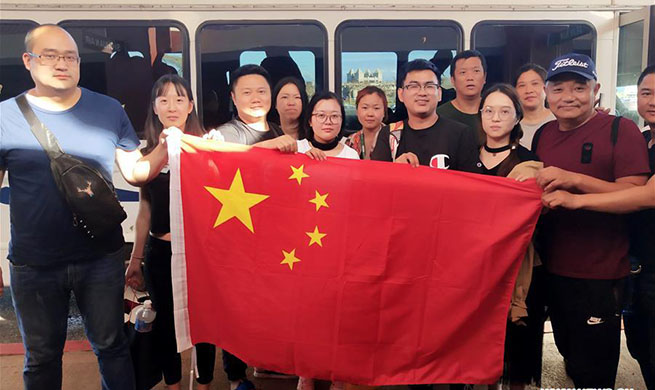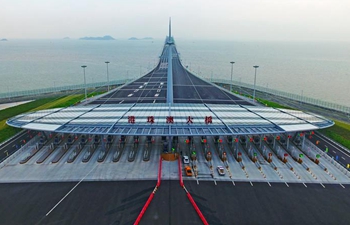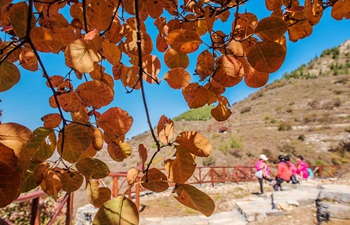By Xinhua writers Cheng Lu and Cheng Di
NANCHANG, Oct. 28 (Xinhua) -- On one of the world's most beautiful mountains stands one of China's most special cinemas. It has ran one, and one film only, for 20-plus years.
The 1980 blockbuster "Romance on Lushan Mountain" was regarded as a milestone moment in entertainment, as it was the first China-made movie that included a kissing scene after reform and opening-up in the late 1970s.
It tells the story of the daughter of a retired Kuomintang general who comes back from the U.S. to visit Lushan Mountain and then falls in love with the son of a Communist Party of China (CPC) general.
But screenings of the film never ended, nor did people's passion for them. Out of nostalgia and curiosity, more than seven million viewers have watched the film since 1980 in the church-turned-cinema on the hillside of Lushan Mountain, east China's Jiangxi Province, where the film was shot.
Half an hour before the movie starts, Dai Xu, a 24-year-old tourist from east China's Anhui Province, queues up to buy tickets. She and her mother then enter the cinema's main hall, looking around the display.
On the walls hang stage photos of the movie's hero and heroine in swimsuits, an introduction of the director and cast, and a 2002 certificate awarded by the Guinness World Records for the longest initial-run of a film in one cinema.
Old-age videotapes, pictures, damaged film copies and original scripts are displayed on the walls. The buttery, salty smell of popcorn from a corner hits Dai immediately.
"I was curious about why this film made a profound impression on my mother. This time I accompanied her to revisit Lushan and review the legendary movie," Dai said.
A total of 360 soft seats quickly fill up. The last row of seating is designated to couples. At least 20 people who don't have seats say they prefer to stand at the back than wait for the next screening.
"There is no vacant seat in the auditorium for the first screening every night, except during mid-winter," said Qian Yisu, manager of the cinema.
A one-piece dress, bell-bottoms, sunglasses, long curly hair and swimsuits...the heroine's fashion and free pursuit of love, coupled with the backdrop of Lushan's picturesque landscape, were a hit across China back in 1980, attracting more than 100 million views across the country that same year, according to Qian.
Wang Bingru, a scholar who participated in the shooting of the film, said that when the movie was released, tourist numbers in Lushan broke records.
"Previously, the mountain mainly served as a rehabilitation center for construction workers. People started swarming into Lushan after 1980. There were no vacant rooms in hotels, so many even slept in parks," Wang said.
The cinema was once a church and was built in 1897. It was turned into a movie theater in the 1960s. Cinemas nationwide saw fewer audiences in the 1990s as television had started entering the ordinary Chinese household.
However, the number of fans of this romantic film did not dwindle. Over 20 years, "Romance on Lushan Mountain" has remained the only movie of this church-turned-cinema, which was actually named after the film.
The film has been shown in the cinema more than 40,000 times so far. According to the Lushan Scenic Area Management Bureau, around 250 out of every 10,000 visitors to Lushan Mountain watch the film.
Wu Hui, a 57-year-old retired projectionist, is among the most enthusiastic fans of the movie. She remembers all the heroine's costumes and lines.
"She changes a costume every three minutes on average and her dazzling dresses surprise me. I didn't imagine that people could lead such a wonderful life," Wu said.
In her memory, people living in the early 1980s usually wore black, white, grey or dark blue clothes with simple designs.
She secretly had a perm after watching the movie for the first time. "My mother ran after me with scissors around the yard," Wu laughed.
The taboo-breaking kiss essentially influenced a change in attitudes towards love and marriage in Wu's generation.
In 1981, Wu met her husband Yang Lin and felt there was a good vibe about him. "Boys were traditionally supposed to chase after girls. The movie told me that it was possible to do the opposite. So I asked him a question, 'Would you come home with me and play the role of my boyfriend?' And he agreed," Wu said.
They met each other's parents at the 2,190th screening of the film. By the 2,920th screening, they had entered into marriage, and by the 3,902th screening, their first baby had been born.
"In addition to fashion and romance, I think the movie shows the true face of a period in Chinese history. It was a time without many entertainment choices. It was a time with pure love and dream," said Dong Zequn, a 59-year-old tourist from the central Chinese city of Wuhan. "There was no movie in my heart that could replace 'the Romance on Lushan Mountain'."
In the film projection booth, Qian Jinyan, 53, works between two human-sized projectors and glances at the audience through a small window.
Despite the fact that the cinema introduced a digital video projector in 2012, he still prefers to be old-fashioned and run one or two screenings with reels.
"People come here out of curiosity or to think over the past. They may feel good when seeing the mottled scratches on the screen and hearing the sound of a film projector moving," he said.
But not everyone shows interest in this old film.
"Sometimes they [tourists] enter the hall, look around and say 'it is too old' and leave without waiting for the film to start," Qian Jinyan said. "I assure that if they watch the film, they will have a smile on their faces when they walk out the cinema. No one dislikes romance and dream after all."





